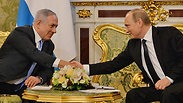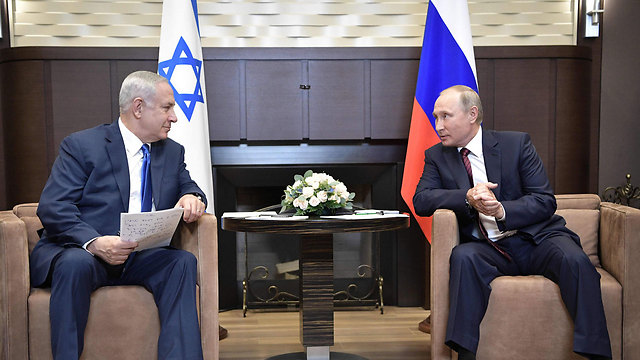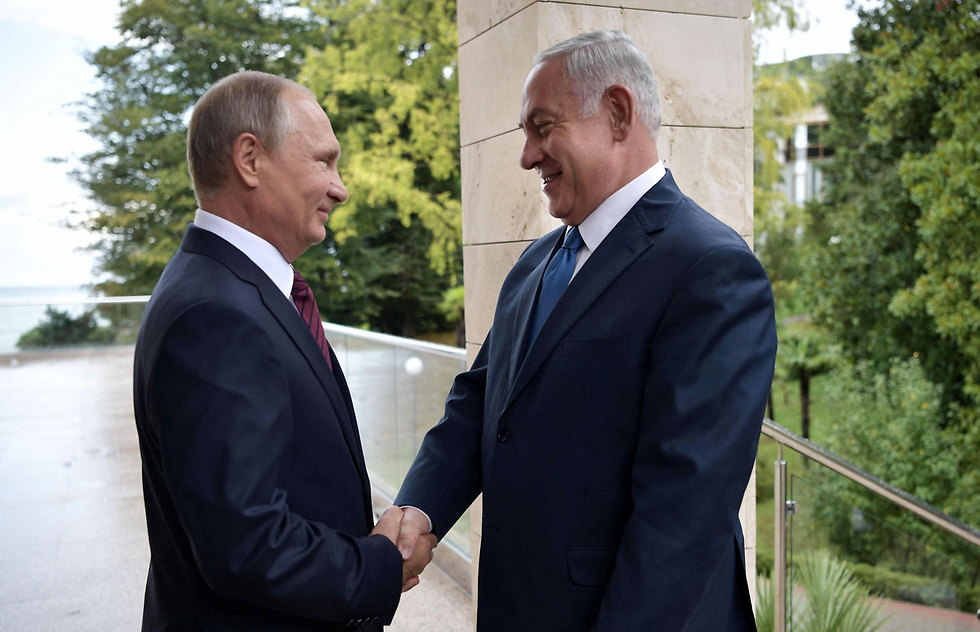
Netanyahu to Putin: Iran wants to take over Syria
In meeting with Russian Pres. Putin, PM Netanyahu warns that 'Iran is moving in everywhere ISIS moves out.'; Netanyahu warns of 'war' if Iran's growing control over Syria is not stopped, stressing that 'this does not fly with Israel.'
Prime Minister Benjamin Netanyahu met with Russian President Vladimir Putin on Wednesday, during which Netanyahu stated that Iran's growing role in Syria poses a threat to Israel, the Middle East and the world. Following their meeting, Netanyahu updated that he told Putin that Iran is looking to take over Syria, stating that "this does not fly with Israel."
"Iran is increasing its efforts to establish its military foothold in Syria. That is dangerous for Israel, the Middle East and, I believe, the whole world. Iran is already in advanced stages of taking over Iraq and Yemen, and in effect it also controls Lebanon.
"Mr. President, we are all defeating ISIS in a concerted international effort, and that is welcome. What is not welcome is Iran moving in everywhere ISIS moves out. We do not forget for one minute that Iran continues to threaten Israel's destruction every day; it is arming terrorist organizations and is itself instigating terrorism; and it is developing intercontinental missiles with the goal of arming them with nuclear warheads. For all these reasons, Israel continues to oppose Iran's entrenchment in Syria. We will defend ourselves in any way against this threat and any threat," Netanyahu told Putin during talks at Russia's Black Sea resort of Sochi.
"We cannot forget for a single minute that Iran threatens every day to annihilate Israel," Netanyahu said. "It (Iran—ed) arms terrorist organizations, it sponsors and initiates terror."
Putin did not address publicly Netanyahu's remarks about Iran's role in Syria. He did, however, hail what he described as an "efficient mechanism of cooperation" between Russia and Israel.
Netanyahu was accompanied in his meeting by the head of the Mossad and the head of Israel’s National Security Council.
The meeting between the Israeli and Russian leaders is the ninth to have taken place within the space of two years. Five such meetings have been held in Russia, as part of Israel's efforts to fend off any further threats posed by Iran on its doorstep.
In the last few weeks, Israel has been been in frantic contact with the Kremlin and the White House amid fears of Iran’s presence continuing in the area unabated in the event that the two powers put ink to any future agreement to end the Syrian conflict.
Israeli hopes were dashed last week after a delegation of high ranking Israeli defense officials sent to Washington failed to secure a commitment from the Americans to ensure the inclusion of such a clause demanding the full withdrawal and exclusion of Iranian forces in the country.
Netanyahu discussed the matter via telephone numerous times with Putin and with US Secretary of State Rex Tillerson. Similarly, security teams from Israel have also discussed the matter with their American counterparts on a number of occasions.
On Thursday however, the Israeli delegation came away from discussions in Washington anxious that Iran is now on the cusp of building naval, air and land bases in Syria and warned that such a reality would constitute the crossing of a red line which Israel would not be able to live with.
Russia intervened in Syria on behalf of Syrian President Bashar al-Assad in 2015, its forces fighting what it deems Islamist terrorists. Russia is acting in partnership with Iran and Lebanon's Hezbollah group, Israel's arch-foes.
In the past few months, Russia has been the main broker of de-escalation zones set up in Syria. Israel worries those zones will allow Iranian troops and Hezbollah forces to deploy in greater strength.
Moscow argues its big-power clout deters Iran or Hezbollah from opening a new front with Israel.
In comments published last week, the chief of Israel's air force said Israel had struck suspected Hezbollah arms shipments in Syria around 100 times during the Syrian civil war, apparently without Russian interference and rarely drawing retaliation.












